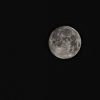Jupiter's Moon's Magnetic Field
In December 1996, Dr. Margaret Kivelson, professor emerita of space physics at the University of California, Los Angeles, and her team of physicists discovered that Europa—one of Jupiter’s moons—had a magnetic field. Flash forward to today where Dr. Kivelson is now a co-investigator working on an instrument that will be used for the Europa Clipper mission. This spacecraft, scheduled to launch around 2022, will study the habitability of Europa, Jupiter’s “ocean moon.”
Kivelson and her team had originally invented a magnetometer (an instrument used in measuring magnetic forces) in order to measure Jupiter’s large magnetic field as well as any variations caused by its numerous moons. They had not intended to make such a significant discovery of finding a magnetic field. After learning that Europa had a magnetic field, the team then went on to discover the first subsurface, saltwater ocean on this alien planet. But what does this mean? In short, if a planet were to have an ocean, it means that there is the possibility that the environment would be able to sustain life. Not even Earth's moon has a true magnetic field!
In January 2000, Dr. Kivelson confirmed what she and her team predicted based on the findings from 1996—after Galileo made a flyby of Europa at a specific orientation, they found evidence of an ocean on it’s surface. Because of this discovery, her team changed the way magnetometers are used during space missions—they are now an essential part of missions, being used for ocean detection.
The magnetometer—and Kivelson’s work—will help find the ocean’s depth and salinity, as well as the thickness of the ice shell above the ocean on Europa’s surface. The European Space Agency is also planning a mission to Europa sometime in the 2020s.
Learn More
Discoveries like these get scientists closer to determining if certain planets and moons are suitable for life—forget man walking on the moon, imagine instead that man can live on the moon! For more information on up-to-date magnetic discoveries, browse through our magnet in the news blog or contact us with any questions.

